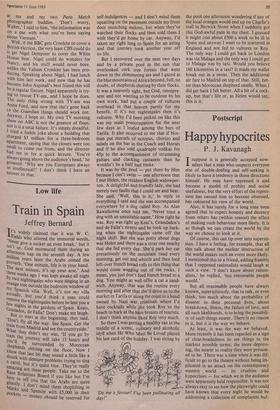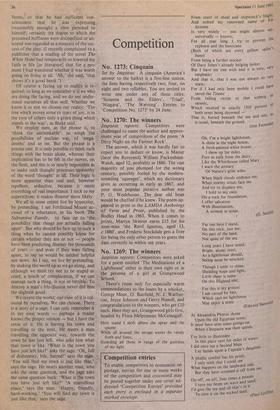Postscript
Happy hypocrites
P. J. Kavanagh
T suppose it is generally accepted now-
adays that a man who suspects everyone else of double-dealing and self-seeking is likely to have a tendency in those directions himself. He may have repressed it and become a model of probity and social usefulness, but the very effort of the repres- sion has caused him to become obsessed, has coloured his view of the world.
Also, it has surely for a long time been agreed that to expect honesty and decency from others has (within reason) the effect of making such behaviour more likely. It is as though we can create the world by the way we choose to look at it.
Of course, this can tip over into supersti- tion. I have a feeling, for example, that all this talk about the nuclear destruction of the world makes such an event more likely. I mentioned this to a friend, adding humbly that I supposed rationalists would laugh at such a view. 'I don't know about ration- alists,' he replied, 'but reasonable people would.'
But all reasonable people have always known, superstitiously, that to talk, or even think, too much about the probability of disaster in their personal lives, about breakdown, illness, the failure of love, and all such likelihoods, is to bring the possibili- ty of such things nearer. There is no reason in it, but it is the way we behave.
At least, it was the way we behaved. More recently it has been regarded as a sign of clear-headedness to see things in the starkest possible terms; the more depress- ing, the nearer to reality they were presum- ed to be. There was a time when it was dif- ficult to go to the theatre without being im- plicated in an attack on the contemporary western world — its cruelties and hypocrisies — for which we in the audience were apparently held responsible. It was not ,,' always easy to see how the playwright could have known that every night he would be addressing a collection of complacent buf- foons, or that he had sufficient con- sciousness that he was expressing (reasonably enough) a view personal to himself; certainly the degree to which the presumed buffoons were discomfited or an- noyed was regarded as a measure of the suc-
cess of the play. (I recently complained to a publisher that a reading of the novel The White Hotel had temporarily so lowered my faith in life [or literature] that for a mo- ment I had wondered whether it was worth going on living at all. `Ah,' she said, 'that shows it's a good book.')
Of course a facing up to reality is re- quired; so long as we remember it is we who are doing the facing, and we do not under- stand ourselves all that well. Whether we know it or not we choose our reality: 'The tree which moves some to tears of joy, is in the eyes of others only a green thing which stands in the way', as Blake said.
We employ men, as the phrase is, to `think the unthinkable': to weigh the possibilities of nuclear war, of 'mega- deaths' and so on. But the phrase is a precise one. It is only possible to think such things with the brain alone, whereas their implication has to be felt in the nerves, on the flesh, and this is so nearly impossible as to make such thought processes unworthy of the word 'thought' at all. Their logic is more apparent than real and, however repellent, seductive, because it omits everything of real importance. I stick to my superstition; it makes disaster more likely.
We all to some extent live by hypocrisy, by pretending. I see Ferdinand Mount ac- cused of a reluctance, in his book The Subversive Family, to face up to 'the possibility that things are actually falling apart'. But why should he face up to such a thing when he cannot possibly know for certain whether they are or not — people have been predicting disaster for thousands of years — and even if they were falling apart, to say so would be neither helpful nor news. As I say, we live by pretending, by making the world up as we go along, and although we must try not to be stupid or cruel, a touch of complacence, if we can manage such a thing, is not so terrible. To destroy a man's life-illusion never did him the slightest good.
We invent the world; our view of it is col- oured by ourselves. We can choose. There is a story of a sage; I can only remember it in my own words — perhaps a reader knows the proper version — but I have the sense of it. He is leaving his town and travelling to the next. He meets a man travelling the opposite way, towards the town he has just left, who asks him what that town is like. 'What is the town you have just left like?' asks the sage. 'Oh, full of dishonesty, bile, hatred!' says the man. `You will find my town is just like that,' says the sage. He meets another man, who asks the same question, and the sage asks the same question back: 'What is the town you have just left like?' A marvellous place,' says the man. 'Happy, friendly, hard-working.' You will find my town is just like that,' says the sage.











































 Previous page
Previous page